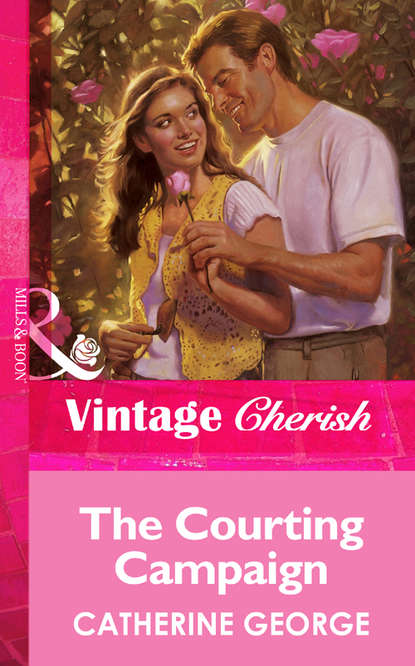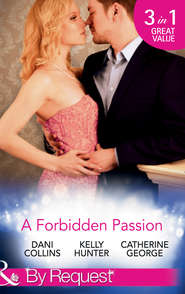По всем вопросам обращайтесь на: info@litportal.ru
(©) 2003-2024.
✖
The Courting Campaign
Автор
Год написания книги
2018
Настройки чтения
Размер шрифта
Высота строк
Поля
‘Is this another legal story?’
He nodded. ‘But a period one this time. Turn of the century. A cause célèbre-type case with a beautiful woman accused of murder, and the defending counsel who gets her off.’
‘Sounds fascinating.’ Hester got up. ‘If you can’t get up to London for research material the Chastlecombe public library is very well equipped—or they’ll find books for you if they aren’t in stock.’
‘Good idea—I’ll join next time I’m in the town.’ He walked outside with her into the still, starry darkness, which in this remote spot had no streetlights to lessen its intensity. ‘It’s very peaceful here. I only hope it isn’t too peaceful and gives me writer’s block.’
‘Is that likely?’
‘I hope not.’ His smile gleamed white in the light above his venerable front door. ‘I’ve been paid a sizeable advance already.’
Hester held out her hand. ‘Then the best of luck. I don’t think I could function with that kind of pressure.’
Patrick took her hand and held it lightly in his. ‘This has been a very good evening for me, Hester. Thank you. I know you’re a busy lady. When can I take you out to dinner?’
‘I don’t have my diary with me.’
‘Then I’ll ring you.’
As Hester drove away she experienced the oddest sensation, as though she was doing the wrong thing, that she was meant to stay. And, though she’d said nothing to Patrick, on the tour of the empty rooms of Long Wivutts she’d experienced a strong feeling of homecoming, as though she belonged there. Strange. She wasn’t the fanciful type. And she’d never even heard of the place before, let alone set foot inside it. Nor, when she’d asked for directions, had David.
When Hester got home she decided to go straight to bed. Tomorrow she was giving her father-in-law lunch, and though Robert Conway was the least critical of men she always felt on her mettle to provide Richard’s father with as delicious a meal as she could contrive. It had been Richard who had taught her how to cook. She had learned so much from him in the cruelly short period of their marriage.
Hester got ready for bed, then looked at the photograph on the bedside table. Richard Conway smiled his crooked smile at her, his heavy black hair unruly on his forehead. He had been a large man in every way, in stature and in temperament. A gentle giant with deep, abiding passions, one of which had been his work. Hester had been the other. Richard had never tired of telling her he’d been waiting for her all his life. The only shadow on their union had been the lack of children, a lack Hester had mourned all the more deeply when she’d been left alone after his death.
Hester turned out the light quickly and lay in the dark. At first, in the weeks after Richard had died, she’d talked to his photograph every night. As some people wrote in diaries, she’d communed with Richard—told him about her day, confided her hopes and fears—just as though he’d been alive and in the bed beside her. Not that they had ever talked much in bed. Richard, from the first, had been a sexually demanding husband, and she had responded gladly, always. And had cried many bitter tears in this same bed after he’d died, missing his physical presence. But, if she were totally honest, there had been more actual conversation with his photograph than with Richard when he’d been alive.
Hester lay staring at the stars through the window, wondering why she’d used her lack of diary as a means of avoiding a definite date for another evening with Patrick Hazard. She always knew exactly how her week was arranged, sometimes for weeks in advance, without reference to a diary or any other reminder. And when Tim Galbraith or John Brigham asked her out she always knew instantly whether the dates they suggested were convenient or not. Yet with Patrick she’d hedged a little, giving herself time to—to what? Plead a previous engagement, or put him off altogether? Hester shrugged, unseen, in the dark. One evening was no big deal. It needn’t be repeated. If discouraged gently, Patrick Hazard had too much pride to persist.
Hester was on the point of falling asleep when she discovered why, exactly, Patrick Hazard was to be tactfully discouraged. Tim Galbraith, Edward Moore and John Brigham, the trio she went out with on a fairly regular basis, were not only nice men and good companions, they had one important thing in common: Richard would have had no objection to any of them. Patrick was different. He posed far more of a threat. Unlike the others, for whom she felt nothing warmer than liking, she was strongly attracted to Patrick Hazard. Even on such short acquaintance. But at this stage the attraction was merely cerebral. Whether it would remain that way if she saw more of him was open to question.
So, one evening with him would have to do. And if he wanted more she would have to think of a convincing reason for her refusal. Patrick Hazard would think she was mad if she cited her dead husband’s disapproval.
CHAPTER THREE
ROBERT CONWAY rose from the table with a smile of appreciation. ‘Excellent lunch, my dear, as always.’
Hester smiled, pleased, as she took their plates. ‘Tea?’
‘Please, Hester.’ His eyes twinkled. ‘Not even an indulgent father-in-law like me can praise your coffee.’
‘The caffeine’s bad for you anyway,’ she said, chuckling. ‘Would you like it out in the garden? The sun’s moved away a bit now.’
When they were settled in deck chairs, Hester in full sun and Robert in the shade of a pear tree, she filled their cups then sat back to enjoy the warm afternoon.
‘So what did you do last night?’ asked Robert.
‘I went out to Avecote to deliver a desk.’ Hester looked at his spare, relaxed frame consideringly, then gave him an account of Patrick Hazard, his novel, and his semi-unfurnished home, and included the meal she’d stayed to share, stressing the fact that her motive had been more in the nature of future furniture orders than to eat dinner with Patrick Hazard.
‘It sounds like a very interesting evening,’ said Robert neutrally. ‘Are you seeing him again?’
Hester nodded, feeling irrationally guilty. ‘Just once, anyway.’
‘Why just once?’ said Robert, and fixed her with a probing eye. ‘Is he married?’
‘No.’
‘Yet you say he’s interesting, and both clever and attractive. Is he gay?’
‘No, nothing like that.’
‘Then enjoy his company.’ Robert drank his tea tranquilly. ‘You’ve done wonders in this garden, Hester. The blossoms on that cistus are like a fall of snowflakes. Your hydrangeas look healthy, too.’
Вы ознакомились с фрагментом книги.
Приобретайте полный текст книги у нашего партнера:
Приобретайте полный текст книги у нашего партнера:











